The attacks in Borno and Adamawa states resulted in one of the highest death tolls in recent attacks by militants who are defying an 8-month old military state of emergency in three states in northern Nigeria designed to halt an Islamic uprising there.
Attackers set off several explosions in Kawuri village in Borno state after launching their assault near the weekly market as vendors were packing up on Sunday night, the security official said.
He said 52 people died and the entire village was burned down, including 300 homes. He also said two improvised explosive devices thet were left behind went off Monday morning, narrowly missing security personnel who were collecting bodies in Kawuri. The official blamed suspected Boko Haram militants for the attack.
A police official who evacuated wounded victims confirmed at least 52 people were killed and 16 wounded. Both officials spoke on condition of anonymity because they are not permitted to speak to reporters.
Ari Kolomi, who fled from his village, which is 70 kilometers (45 miles) outside Maiduguri, the Borno state capital, said, "No house was left standing" by the more than 50 extremists who attacked, armed with explosives and guns. Kolomi was searching for relatives in the village to make sure they had survived the attack.
State Police Commissioner Lawan Tanko confirmed the attack but said he was awaiting details on the casualties.
Also on Sunday, suspected militants in Adamawa state, south of Borno, stormed a Roman Catholic church during a Sunday morning service in Wada Chakawa village. They fired guns into the church, set off explosives and took people hostage during a five-hour siege, residents said. The Rev. Raymond Danbouye, a spokesman for the Catholic Diocese of Yola, said dozens of people were killed.
Local Chairman Maina Ularamu said officials recovered 45 bodies including those of two police officers. He urged calm, saying: "I believe security operatives are on top of the situation."
Villager Moses Apogu said, "They used explosives during the attack on worshippers, and many people lost their lives." Another resident, who spoke on condition of anonymity for fear of reprisals, said some of the people taken away were later killed.
Brig. Gen. Rogers Nicholas, commander of a local brigade said officials were still tallying the death toll and that troops were deployed to track the attackers.
Nearly 200 people have been killed this month in attacks by suspected members of the Boko Haram terrorist network in the area around Maiduguri. The city is the birthplace of the group, whose name in the local Hausa language means "Western education is forbidden."
A Jan. 14 car bomb exploded in Maiduguri, killing about 70 people. Officials blamed Boko Haram, though the state governor suggested it was the work of political opponents.
Other attacks have forced the flight of hundreds of villagers in about 30 farming communities around Maiduguri. Some of the displaced are camping on the outskirts of the state capital. More than 5,000 refugees from the violence have fled to Cameroon and Niger this month, the U.N. said last week.
MAIDUGURI, Nigeria January 27, 2014 (AP), By HARUNA UMAR Associated Press











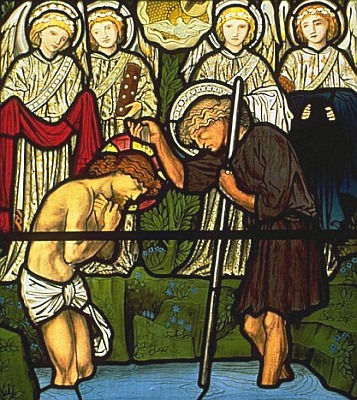


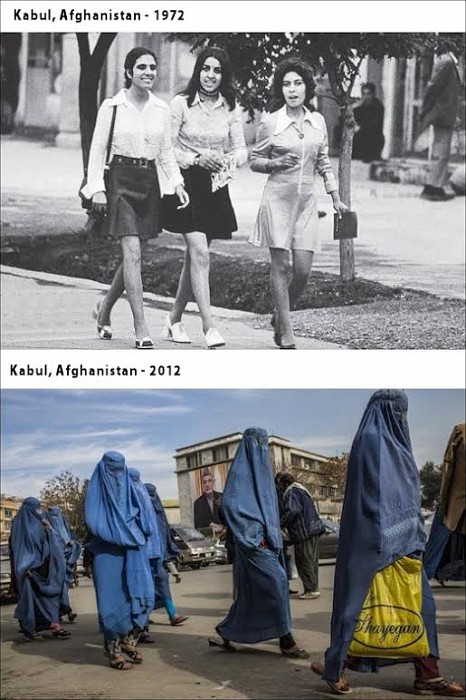


 I shared my own struggles with accepting criticism and offered some tips to being open to learning from critical feedback from others.
I shared my own struggles with accepting criticism and offered some tips to being open to learning from critical feedback from others. This number can be found on the watch mechanism itself. Here, it is engraved on the rotor bridge: 6119 C. The letter after numbers indicates version (A, B, C etc) Calibre number is essential when ordering MOVEMENT parts.
This number can be found on the watch mechanism itself. Here, it is engraved on the rotor bridge: 6119 C. The letter after numbers indicates version (A, B, C etc) Calibre number is essential when ordering MOVEMENT parts.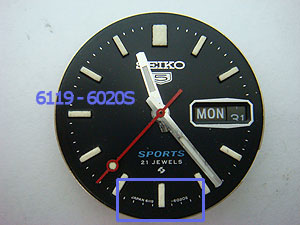 It is located ON THE WATCH DIAL underneath the 6 o'clock position. Very fine print, you need an eye glass to read it.
It is located ON THE WATCH DIAL underneath the 6 o'clock position. Very fine print, you need an eye glass to read it.  This one is 6119-6020S. What does it mean? During the watch production, each movement can be fitted with practically an unlimited number of dials. Black, white, silver, gold, different height, day/date or date only etc. And each dial would have corresponding calendar wheels and set of hands. Therefore 6119-6020S means that dial set is 6020 S style (black dial, silver hands with luminous material, silver hour markers etc) and it is married to movement calibre 6119. This number is essential for ordering dial parts.
This one is 6119-6020S. What does it mean? During the watch production, each movement can be fitted with practically an unlimited number of dials. Black, white, silver, gold, different height, day/date or date only etc. And each dial would have corresponding calendar wheels and set of hands. Therefore 6119-6020S means that dial set is 6020 S style (black dial, silver hands with luminous material, silver hour markers etc) and it is married to movement calibre 6119. This number is essential for ordering dial parts.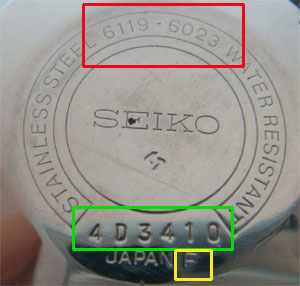 Again, it starts with the calibre number followed by the case style number: 6119-6023 The case style describes the physical case properties:
Again, it starts with the calibre number followed by the case style number: 6119-6023 The case style describes the physical case properties: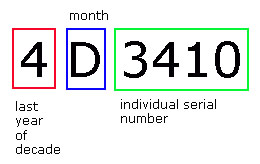 The first digit on the case back represents the LAST digit of manufacturing year decade. If you know the decade of production (70s, 80s, 90s) then you can figure out when your watch was manufactured. The second number/letter is the month. 1=Jan 2=Feb etc 9=Sept 0= Oct *note this is 0 not letter O N=Nov and D=Dec So my watch was produced in December ???4. As you can see, the number alone is not sufficient to determine the actuall age of the watch (unless you have a new-ish one) but based on the movement calibre and style, I would guess that most likely it was made in December 1974. The rest of the digits present is actually the serial number 3410. It was a #3410 of reference [6119-6023] produced in month of December. Finally the letter F (yellow) is country code - while the case back is stamped JAPAN the watch could still have been produced in Seiko's overseas factory. Obviously, it is absolutely crucial to know the calibre, dial number and model reference number when referring to your watch or when ordering spare parts. It is always a good idea to quote ALL numbers to your spare parts supplier: "I need [this part] for Seiko caliber 6119 C (note C!) dial number 6119-6020S and case number 6119-6023."
The first digit on the case back represents the LAST digit of manufacturing year decade. If you know the decade of production (70s, 80s, 90s) then you can figure out when your watch was manufactured. The second number/letter is the month. 1=Jan 2=Feb etc 9=Sept 0= Oct *note this is 0 not letter O N=Nov and D=Dec So my watch was produced in December ???4. As you can see, the number alone is not sufficient to determine the actuall age of the watch (unless you have a new-ish one) but based on the movement calibre and style, I would guess that most likely it was made in December 1974. The rest of the digits present is actually the serial number 3410. It was a #3410 of reference [6119-6023] produced in month of December. Finally the letter F (yellow) is country code - while the case back is stamped JAPAN the watch could still have been produced in Seiko's overseas factory. Obviously, it is absolutely crucial to know the calibre, dial number and model reference number when referring to your watch or when ordering spare parts. It is always a good idea to quote ALL numbers to your spare parts supplier: "I need [this part] for Seiko caliber 6119 C (note C!) dial number 6119-6020S and case number 6119-6023."



